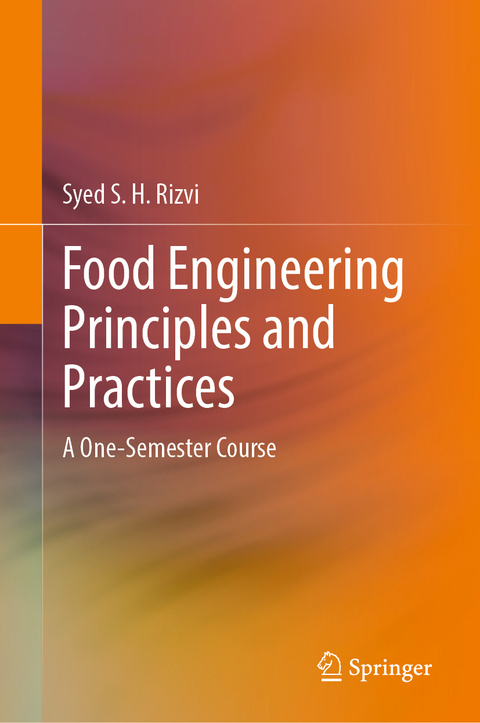
Food Engineering Principles and Practices
Springer International Publishing (Verlag)
978-3-031-34122-9 (ISBN)
This textbook is designed for a one-semester course on Food Engineering, and it offers a concise, in-depth and integrated introduction to the fundamental engineering and physicochemical principles and practices of utility in food processing and manufacturing operations. The textbook includes topics mandated by the Institute of Food Technologists for accreditation of Food Science curricula and helps prepare the students better for taking advance courses related to unit operations in food manufacturing. It is also relevant for Food Process Engineering courses, containing materials that most instructors can cover in three semester hours of instruction. In the first three chapters, readers will find an overview of the basic knowledge of physics and chemistry and an introduction to the engineering language needed to eliminate confusion going forward. In the following chapters, the author covers the main concepts of food thermodynamics, heat transfer-radiation in foodmaterials, mass transfer and fluid dynamics in food, along with real-life examples and exercises to help students relate better to the topics. The author also gives a brief introduction to the main mathematical and analytical concepts required in food engineering.
This textbook equips readers to understand a diversity of food engineering related topics and each chapter is enriched with practical examples and Check Your Understanding sections, as well as several problems. The textbook is aimed at undergraduate food science students in their first required introductory food engineering course, but practitioners involved in designing, optimizing, and managing the processing of food products will also find it a useful account.
lt;p>Syed S. H. Rizvi is an International Professor of Food Process Engineering at Cornell University and has served as Director of Graduate Studies of the Field of Food Science & Technology. He is also Adjunct Professor in the School of Chemical and Biomolecular Engineering at Cornell, and in the Department of Chemical Engineering, at the University of Toronto in Canada, and he has been a Visiting Professor at several universities including Bogor Agricultural University (Indonesia), the Institute of Food Technology (Brazil) and the University of Toronto. Professor Rizvi teaches courses devoted to engineering and processing aspects of food science and related biomaterials. His main research focuses on experimental and theoretical aspects of bioseperation processes using supercritical fluids and membranes, cryogenic freezing, bioactive delivery systems, high pressure extrusion with supercritical carbon dioxide, physical and engineering properties of biomaterials, and novel food processing technologies. He has published 200+ technical articles, co-authored/edited eight books, holds nine patents, and serves on the editorial boards of several journals. He was selected as a Jefferson Science Fellow by the National Academy of Sciences and served as a Senior Science Adviser at the U.S. Department of State in Washington DC in 2007-2008. He received the Excellence in Teaching Award in 1991, 2014, and 2019 by the Food Science Advisory Council at Cornell University, and other academic honors including the Institute of Food Technologists' Marcel Loncin Research Prize (2000) and the Bor S. Luh International Award (2010), the Stanley Watson Award from the Processing and Engineering Division of the AACCI (2012), the International Association for Engineering and Food (IAEF) Lifetime Achievement Award (2019), the American Society of Agricultural and Biological Engineers International Food Engineering award (2021) and the Career Accomplishment award from the College of Agriculture and Life Sciences at Cornell University (2021).
Chapter 1: Basic Concepts and Material Properties.- Chapter 2: Systems, Processes and Phase Equilibria.- Chapter 3: Thermodynamics: Basic Concepts.- Chapter 4: Mass and Energy Balances.- Chapter 5: Fluid Mechanics: Basic Concepts.- Chapter 6: Fluid Mechanics: Applications.- Chapter 7: Heat Transfer: Steady State Conduction.- Chapter 8: Heat Transfer: Steady State Convection.- Chapter 9: Heat Transfer: Unsteady State.- Chapter 10: Heat Transfer: Radiation, Dielectric and Ohmic.- Chapter 11: Mass Transfer: Basic Concepts.- Chapter 12: Refrigeration.- Chapter 13: Psychrometrics.
| Erscheinungsdatum | 10.03.2024 |
|---|---|
| Zusatzinfo | XXIV, 528 p. 1 illus. |
| Verlagsort | Cham |
| Sprache | englisch |
| Maße | 155 x 235 mm |
| Themenwelt | Naturwissenschaften ► Chemie ► Technische Chemie |
| Technik | |
| Schlagworte | Basics of food manufacturing • Engineering fundamentals • Fluid dynamics in food • food engineering • Food Physical Chemistry • Food Processing • Food science principles and practices • Food Thermodynamics • Heat transfer in food processing • Mass transfer in food • One-semester course • Psychometric properties of food |
| ISBN-10 | 3-031-34122-8 / 3031341228 |
| ISBN-13 | 978-3-031-34122-9 / 9783031341229 |
| Zustand | Neuware |
| Informationen gemäß Produktsicherheitsverordnung (GPSR) | |
| Haben Sie eine Frage zum Produkt? |
aus dem Bereich


